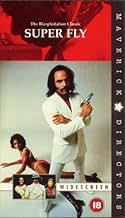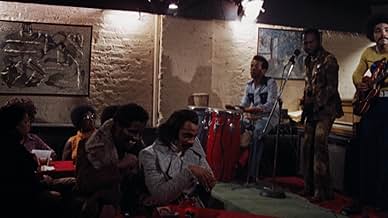CALIFICACIÓN DE IMDb
6.4/10
9.1 k
TU CALIFICACIÓN
Relata la rutina diaria de Priest, un traficante de cocaína que quiere conseguir un trato más y retirarse.Relata la rutina diaria de Priest, un traficante de cocaína que quiere conseguir un trato más y retirarse.Relata la rutina diaria de Priest, un traficante de cocaína que quiere conseguir un trato más y retirarse.
- Dirección
- Guionista
- Elenco
- Premios
- 1 premio ganado y 1 nominación en total
Sheila Frazier
- Georgia
- (as Shiela Frazier)
Julius Harris
- Scatter
- (as Julius W. Harris)
Charles McGregor
- Fat Freddie
- (as Charles MacGregor)
James G. Richardson
- Junkie
- (as Jim Richardson)
Fred Ottaviano
- Police
- (as Fred Rolaf)
- Dirección
- Guionista
- Todo el elenco y el equipo
- Producción, taquilla y más en IMDbPro
Opiniones destacadas
One of the grittiest of the so-called blaxploitation films of the 1970s, Gordon Parks Jr's Superfly can really catch audiences off guard and sober them up. Ron O'Neal's brooding performance as retiring drug dealer Youngblood Priest is excellent, as is the consistently evident tension between the races (expertly captured by Parks). I recently had the opportunity to see Superfly at a film festival, and Curtis Mayfield's on-screen appearance in a nightclub received a warm round of applause from the packed theater. Mayfield really did deliver one of the greatest soundtracks in film history for Superfly. "Pusherman," "Freddie's Dead," the title song and many others are just incredible.
This was Director Gordon Parks'Jr. follow-up to one of the most successful and also one of the top five highest grossing pictures of 1971,the straight in-your face blaxploitation crime-drama,"Shaft",starring Richard Roundtree. This time around,he goes for the exploitation genre a bit further and this time it comes up a bona fide winner. Say what you want about this film,but when it first came out in the summer of 1972,the film became one of the top ten highest grossing pictures of that year. SUPER FLY was a major classic that was a huge success,and established Gordon Parks to make a second film for Warner Bors. Pictures,because he made history three years earlier as one of the first African-Americans to get financing for his first feature for the Warner Bors. studio,the 1969 autobiographical drama "The Learning Tree". However,SUPER FLY made a fortune for Warner Bors.,since the studio was about to jump on board the blaxploitation genre,and opened the doors for several movies to be produced for the studio,which including the following year the comedies,"Uptown Saturday Night",and the blaxploitation crime-dramas,"Cleopatra Jones",the sequel,"Casino Of Gold","Black Sampson","Black Cobra",and the classic martial-arts adventure/blaxploitation flick "Enter The Dragon". SUPER FLY was a slick urban romp had an appeal to its adult audiences,but because of the content of the film and its usage of drug abuse and drug substance together with the over count of its violent content,made it one of the most controversial movie ever made,and even for the year 1972,it was describe by some to be very intense with its subject matter and explicit language and some nudity. This was in fact shot on an low-budget theme that was released at the beginning of the blaxploitation/Black Cinema experience and it came out at a time when the Black Cinema movement exploded after the huge success of SHAFT and SWEET SWEETBACK. The main character here is Priest(played with absolute perfection by Ron O'Neal),who wants out of the drug business,but wants to make one last score before he calls it quits. Along the way,he is hassled by the cops,former associates and not to mention those who want to settle a score with him,but in all he gets back at them towards the end,but here the film delivers a powerful message here:the emptiness of the American dream. Priest may want to be out of the business,not because he hates them,but dealing with the endless hassle to sell anything illegal,and from that he just trying to make the best of what he has here,not just by selling but by any means necessary to survive. This is one hard edged gritty crime drama that tells it like it is with no holds-barred punches and straight to the point. A real honest look at the effect and ultimate destruction of drugs and the life of the drug dealer up close and personal. With an supporting cast that includes Shelia Frazier as Priest's girlfriend,Georgia,along with Julius Harris, the late Carl Lee,and Charles McGregor,with a brilliant screenplay by Phillip Fenty and music by Curtis Mayfield,whose brilliant soundtrack to this film was Grammy Nominated in 1972 for Best Soundtrack Album and Best R&B Album of that year...whose songs on this soundtrack for this film are standard classics these days,but as for the movie itself,its a piece of Black Cinema not to be missed. Rating:**** out of *****
Youngblood Priest (Ron O'Neal) is a cocaine dealer who begins to realize that his life will soon end with either prison or his death. He decides to build an escape from the life by making his biggest deal yet, converting the coke to cash and running off to start a new life.
You have to love the musical score from Curtis Mayfield; "Super Fly" is one of the few films ever to have been outgrossed by its soundtrack. And there are lots of interesting facts about this film: The film was shot by director of photography, James Signorelli, who would go on to become the film director at Saturday Night Live. The director's father, Gordon Parks, was the director of "Shaft", another blaxploitation classic, and financed this movie with the help of two dentists.
Does the film glorify drug use (particularly cocaine use)? I suppose that depends on your interpretation. Many say it does, the creators say it was intended to show the negative aspects of drug culture. I can see it both ways. I mean, gee, your hero is a drug pusher. But his life is hard... and yet, this hard life is presented as glamorous. Who knows?
You have to love the musical score from Curtis Mayfield; "Super Fly" is one of the few films ever to have been outgrossed by its soundtrack. And there are lots of interesting facts about this film: The film was shot by director of photography, James Signorelli, who would go on to become the film director at Saturday Night Live. The director's father, Gordon Parks, was the director of "Shaft", another blaxploitation classic, and financed this movie with the help of two dentists.
Does the film glorify drug use (particularly cocaine use)? I suppose that depends on your interpretation. Many say it does, the creators say it was intended to show the negative aspects of drug culture. I can see it both ways. I mean, gee, your hero is a drug pusher. But his life is hard... and yet, this hard life is presented as glamorous. Who knows?
Long "Maxi" coats and "Superfly" hats with platform shoes: yes, I was one who jumped into the fashion trend at the time. I hat a purple hat and coat and four-inch platforms after this film came out. I wish I had a picture. :-)
This was a defining film that mightily affect a generation. The music of Curtis Mayfield made it even more enjoyable. It wasn't just a blaxploitation film, it was a good experience.
Sure the fights were lame, the acting nothing to write home about, and even the sex scenes left a lot to be desired, but this was an important film. See it ass soon as you can.
This was a defining film that mightily affect a generation. The music of Curtis Mayfield made it even more enjoyable. It wasn't just a blaxploitation film, it was a good experience.
Sure the fights were lame, the acting nothing to write home about, and even the sex scenes left a lot to be desired, but this was an important film. See it ass soon as you can.
Ron O'Neal is so cool as priest. And I love his car. Its the soundtrack by Curtis Mayfield that makes this movie great. Its right up there with the searching for Sugar man soundtrack. The music is so cool. I watched scene's over and over again just so I could listen to the music. I could have just listened to the soundtrack by itself. So why didn't I? I liked watching what was happening in the movie and listening to the music that went along with it. It was certainly a movie wroth the time it took to watch multiple times. Because I did watch it over and over again.
¿Sabías que…?
- TriviaThis is one of a few films with a soundtrack that grossed more than the film itself.
- ErroresThe number of men attacking Priest in the final fight scene varies from shot to shot, though, from the angles used, there should be a consistent number.
- Citas
Youngblood Priest: I'm gettin' out, Eddie.
Eddie: Gettin' outta what?
Youngblood Priest: The cocaine business.
Eddie: Oh, sweet. Sh*t. Say, those junkies must have knocked a hole in your head. You're gonna give all this up? 8-Track Stereo, color T.V. in every room, and can snort a half a piece of dope everyday? That's the American Dream, nigga! Well, ain't it? Ain't it?
- Versiones alternativasThe Warner Bros. logo in some prints including the 2023 airing on TCM is plastered with the 2001 variant.
- ConexionesEdited into The Cinema Snob: Freddy's Dead: The Final Nightmare (2018)
Selecciones populares
Inicia sesión para calificar y agrega a la lista de videos para obtener recomendaciones personalizadas
- How long is Super Fly?Con tecnología de Alexa
Detalles
- Fecha de lanzamiento
- País de origen
- Idioma
- También se conoce como
- Superfly
- Locaciones de filmación
- Harlem, Manhattan, Nueva York, Nueva York, Estados Unidos(Mister B's bar, 2297 7th Avenue and West 135th Street)
- Productoras
- Ver más créditos de la compañía en IMDbPro
Taquilla
- Presupuesto
- USD 58,000 (estimado)
Contribuir a esta página
Sugiere una edición o agrega el contenido que falta





























